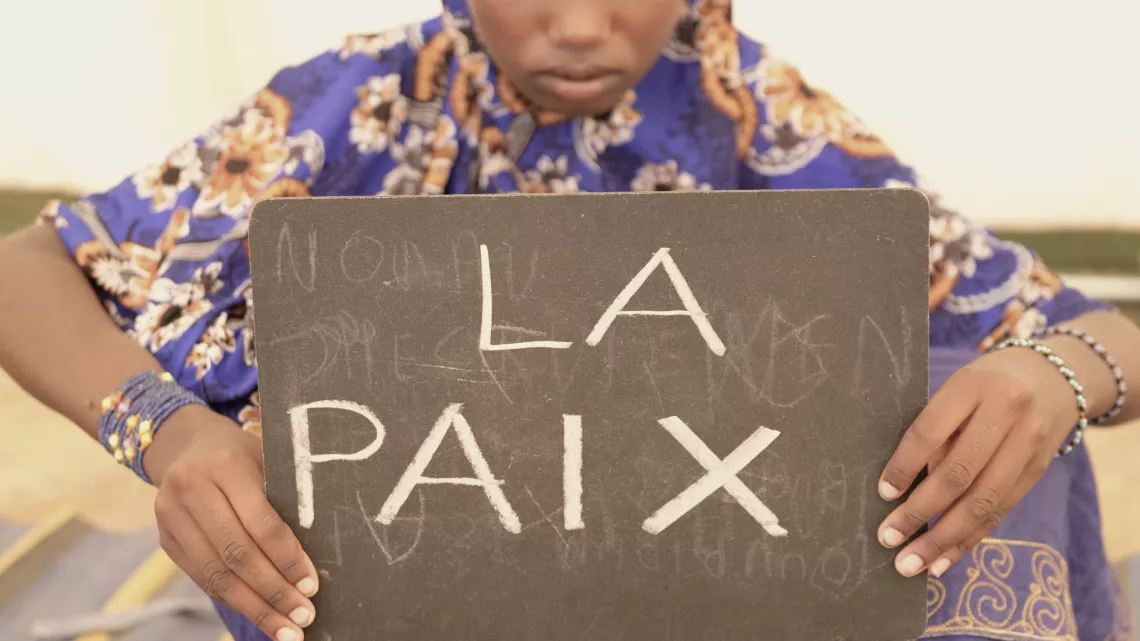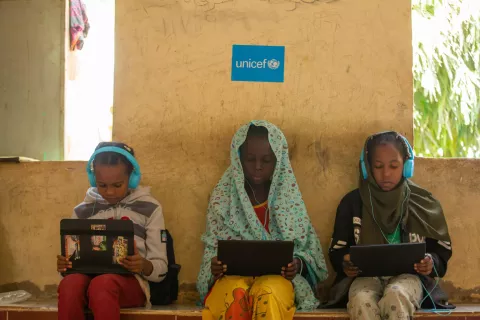A shattered life, slowly on the mend in Mali
Escalating violence in Mali’s Mopti region has displaced tens of thousands of people. Children are becoming the primary victims.

- Available in:
- English
- Français
BAMAKO, Mali – “We started running into the dark. As we were running, my mother was shot,” Aminata* says, recalling the night in March when her tiny village of Ogossagou, in the Mopti region of central Mali, was attacked by an armed group. More than 150 people were killed in the attack, including 85 children.
“I ran back to help her, and I was shot in the leg,” Aminata says. She collapsed in pain next to her mother outside the village. She remembers waking up in the hospital to the news that her mother had died.

Adding fuel to the fire
Aminata’s story is a tragically familiar one in Mopti, where outbreaks of intercommunal violence and nighttime raids by armed groups have ignited pre-existing tensions over land and grazing, and fueled a displacement crisis.
Repeated attacks have led to children losing lives, beloved parents and siblings, and homes. Children are being injured, abducted and recruited by armed groups, detained, separated from families, and exposed to violence, including rape and other forms of sexual violence, and psychological trauma.
According to the Government and International Organization for Migration, more than 50,000 displaced people, many of them children, had been registered in the Mopti region by June 2019, mainly in areas close to the border with Burkina Faso. Many families, including Aminata’s, have made their way to the region’s capital, the city of Mopti, or to the nearby town of Sévaré.
As attacks from armed groups have multiplied, children are fast becoming the primary victims: violations against children, particularly killing and maiming, have increased significantly since the beginning of 2019.
“I was with my mom and my family the night they attacked,” Aminata says. “We heard gunshots and then we saw everything in our village was on fire.”
Aminata was taken to Mopti for surgery to remove the fragments of bullets still lodged in her leg. She says the surgery went well, but that she’s still in severe pain. She now walks with the assistance of a homemade wooden crutch. She says she is gradually getting used to the ongoing pain, as well as life in the camp for internally displaced persons that has become her temporary home.
We heard gunshots and then we saw everything in our village was on fire.

UNICEF and partners have set up clean water systems, tents and a temporary learning space where children can play games and get back to learning. But adjusting to life in the camp has still been tough for Aminata. Hailing from a community of herders, she is used to having the open spaces of the Sahel where animals would graze freely.
“It’s not easy here,” Aminata says. “I can't run and play like other children, and I can’t do all the household chores girls are expected to do.”
The walls around the camp protect families from bandits and other armed groups, and have gradually brought a sense of calm to a population feeling vulnerable after so many deadly attacks. Everyone in the camp has a story of loss and displacement, of struggling to find a way to survive against all odds.

Amid the insecurity and the flood of displaced people, UNICEF is working closely with the United Nations and other humanitarian partners, local authorities and NGOs to provide children like Aminata with a range of assistance that will help them on the path to recovery.
But for Aminata, the road ahead will be a difficult one. She has been told that she might never again be able to walk without a crutch. She’s also receiving counselling and attending a temporary learning space to help her get ready to go back to school. Slowly, Aminata is rebuilding her childhood through learning. And while no-one can replace her mother, and no one can unburn her home, the fragile shell of childhood is beginning to grow around her again.
For now, Aminata is living with her brother in the camp. They keep in touch with their father, who stayed in their home village guarding what’s left of their belongings and their livestock.
“I don't care where I go next,” she says. “I just want peace.”
*Name has been changed to protect her identity.



